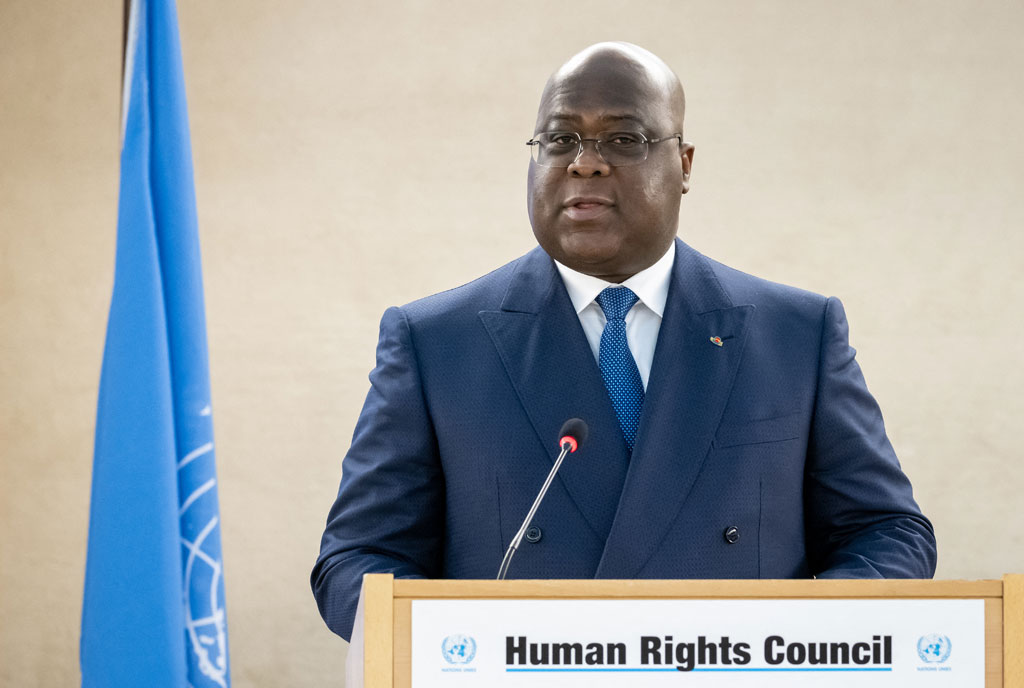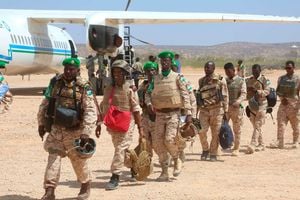Tshisekedi appeals for international community to end DR Congo conflicts

Democratic Republic of Congo President Felix Tshisekedi delivers a speech during the 52nd UN Human Rights Council session, in Geneva, on February 27, 2023. PHOTO/AFP
What you need to know:
- Even when Rwanda has continuously denied any support for the M23 rebels, President Tshisekedi told the Human Rights Council that Kigali needs to be brought to order.
The Democratic Republic of Congo (DR Congo) President Felix Tshisekedi has asked the international community to help him restore peace in the war-torn country.
“For 30 years, DR Congo has been the theatre of the most abominable human atrocities. My country has been plunged into chronic insecurity and instability which has isolated us from the rest of the world, tainted our image and compromised our ability to conduct effective and successful policies for development,” President Tshisekedi said while addressing the UN Human Rights Council.
He also warned that the ongoing conflicts could affect upcoming general elections slated for December 20.
"The persistence of the war in the east of our country risks jeopardizing the electoral process, which is already underway, due to a massive displacement of people from combat zones, the insecurity and the inaccessibility of these areas," President Tshisekedi noted.
The conflict has left hundreds dead and others displaced, with many seeking refuge in neighbouring Uganda.
Even when Rwanda has continuously denied any support for the M23 rebels, President Tshisekedi told the Human Rights Council that Kigali needs to be brought to order.
“It is no secret to anyone that they are supported, armed by some states of the region, such as Rwanda and by foreign financial sectors,” he said adding that “these approximately 150 groups, including the M-23 rebels, mainly operate in the provinces of Ituri, Maniema and North Kivu, among others.”
The US has also previously accused Rwanda of deploying troops in the DR Congo, adding blame to Kigali’s role in violence in the vast neighbouring country.
President Tshisekedi pleaded for a creation of an international criminal tribunal for the DRC.
Rising hunger, poverty
Other issues that took centre-stage at the opening of the 52nd ordinary session of the Geneva-based Council included Russia-Ukraine war, climate change, food security and poverty, among others.
The UN General Assembly President Csaba Kőrösi issued a stark warning that Russia’s actions had “effectively paralysed the UN Security Council,” the primary international forum tasked with maintaining peace and security.
He further said the Security Council, like the General Assembly, was at crossroads on the issue.
UN Secretary General António Guterres told the Human Rights Council that the Russia-Ukraine war had “triggered the most massive violations of human rights we are living today”.
He decried massive conflict-related sexual violence against men, women and girls, that have been documented in Ukraine in the past year.
"Every day brings new evidence of human rights violations, from summary executions and torture to enforced disappearance and sexual violence. Around the world, antisemitism, anti-Muslim bigotry, the persecution of Christians, racism and white supremacist ideology are on the march," Guterres emphasized.
According to him, "religious, linguistic and ethnic minorities, LGBTQI+ and other minority communities are targeted for harassment and hatred.”
The UN observes that “extreme poverty and hunger is also rising for the first time in decades with nearly half of the world’s population, 3.5 billion people, living in climate hotspots.”




